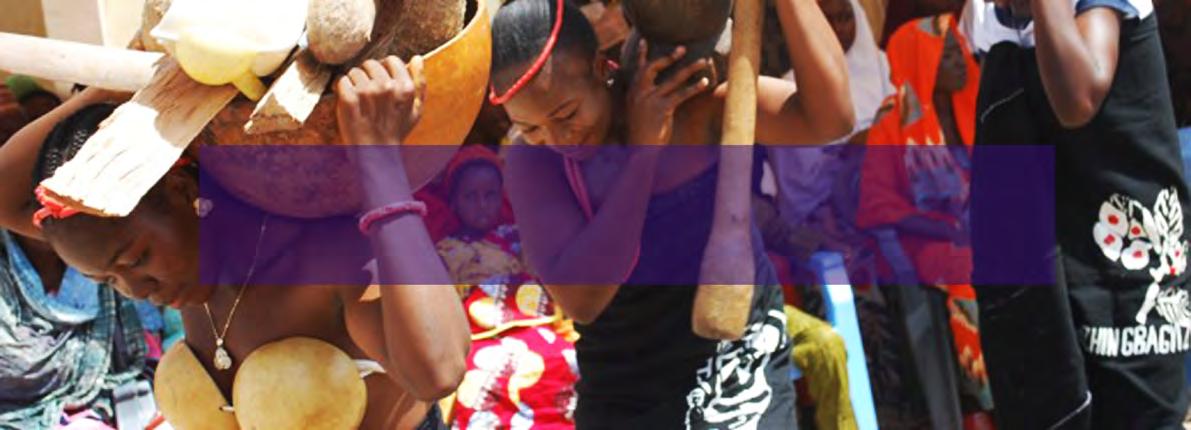
5 minute read
BETTER THAN
CULTURAL HERITAGE THE GBAGYI PEOPLE IN NIGERIA BY: DANIEL ADAMILO AARON

Advertisement
Gbagyi people also referred to as Gwari or Gbari are one of the largest ethnic groups in Nigeria, present in four states namely Niger, Kaduna, Plateau states and the Federal Capital Territory. Some live in Kogi state. They are interspersed with other people in In many places, particularly in FCT, Kogi and Kaduna states. They are divided into two main groups eastern and western. The eastern groups is called Gbagyi-Ngenge or Gbagyi-Matai and they are more populous. The western groups are called Gbagyi-Nkwa or Gbagyi-Yamma. The western and eastern groups speak different languages, and within them, there are subgroups and dialects. Not all Gbagyi agree on what the divisions are. The Gbagyi people are one of the ethnic groups in Nigeria that hold on tightly to their believes and traditions. They have continued to stick to their traditions, despite the rapid urbanization that has occurred on their land. the vast population of rural dwellers are getting influenced by the modern ways as Their attitude towards modern clothing and medical care is increasingly positive, however most rural Gbagyi, being farmers, They see education as a waste of time. Although the present generation are slowly drifting away from the customs but notwithstanding they still respect their customs. One of such customs of Gbagyi women is the placing of goods however heavy on their shoulder. Gbagyi women believe the head represent the king of the entire body; hence it should not be disturbed. It is quite interesting to find out that this custom is still been practiced among the Gbagyi people up till now. They call the part of their body they place their goods as Bwapa. Gbagyi women believe the load feel lighter on their shoulders than on their heads. 014
Another reason why this tradition has been upheld till now is that younger ones observe the older ones, hence they take it as a norm. By tradition The Gbagyi men are not expected to carry loads, They believe it was ordained by their ancient God not to carry loads. Marriage among the people of Gbagyi is soaked in deep tradition. When a man announces his interest in a woman, he would have to serve 7 years in the bride’s father’s farm, Labouring and supplying grains and other produce to the bride’s house in order for her to be well fed. the people of Gbagyi seem to be aware of the power of money; the groom simply pays the bride’s price instead of serving 7 years in the bride’s father’s house. The Gbagyi people are friendly and famous for their cheerful and peacefull disposition in every community, They initially used to live on mountain tops because they believed they were safer on the mountain than at the plain. However when western civilization began to spread, most of them relocated to the plains, with the exception of the older ones who saw the mountain as a source of spiritual power and security. They felt they could protect themselves easily from attackers at the mountain tops by hauling stones at them. The Gbagyi people enjoy eating a meal known as Wyizhe. It is made from Guinean corn and it is also used to make a special drink known as zhepwo. They also enjoy drinking a soup known as Knadolo made from locust beans. They have special clothing known as Ajeside made from local cotton and traditional woven. This clothing is then dyed by special dressmakers. The two main festival among the Gbagyi people are Agbamaya festival and the Zhibaje. The AGBAMAYA is a festival celebrated to welcome the coming of the rain, during the rainy season while the ZHIBAJE festival is usually celebrated in CHRISMAS. Gbagyi people also have a gerne of music they call KABULU and also tradition nal musical instrument call MULO



Gbagyi People are majorly farmers although they are also good in Hunting, wood fetching, pottery, weaving and blacksmith. The Gbagyi people were also well known for their visual art skills set, most especially pottery. Other arts Practiced by the Gbagyi people are Sculpture, iron smelting, domestic craft and smelting. Pottery was a way the women could support and compliment the hard work of their men as their handiworks provided a means of carriage for the farm produce realized during harvest to either their homes or to the market for sale. Occupations like hunting and weaving are not common nowadays as they were in earlier days, Women take great pride in their large piles of firewood. Their dedication and skill drew open the curtains of recognition, which led to the establishment of The Ushafa Pottery hub situated somewhere within the Gbagyi Area Council of the Federal Capital Territory. Which Was a “Better Life Rural Women project” established in 1991 as part of the one-time first lady of Nigeria Mrs. Maryam Babangida’s during her tenure as the Nigerian First Lady. Owing to their mastery of pottery making, the site has since become famous and the community has witnessed the visit of world dignitaries. In this present time, it has become an international site for trading pottery and a centre where the making of traditional pottery can be observed by tourists.
The Gbagyi people attach absolute importance to farming. They basically grow food crops such as yam and grains. The advancement of Modern agricultural practices has also become a trademark amongst Gbagyi settlements as most people among the Gbagyi tribes now engage in large scale farming of crops and livestock for both domestic and commercial purposes.


USHAFA POTTERY HUB LOCATED IN BWARI,ABUJA,NIGERIA





